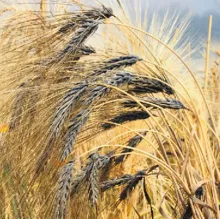A multi-million pound programme of strategic research delivered over five years providing science and evidence to support policymakers and its partners. Informed by strong partnerships and the needs of a broad range of stakeholders. Science at the heart of society contributing to the health, wealth and wellbeing of Scotland and beyond.
Ongoing research (2022-2027)
Barley to support food and drink innovation
This project evaluates whether whole grain phytochemical-rich barley accessions developed from ancient grain (for improved climate credentials) can produce a significant change in blood sugar levels to complement the established lipid lowering health claims related to barley β-glucan. This project supports new food and drink market opportunities and promotes barley as a healthy and sustainable crop.

Breeding and management strategies for sheep in the Scottish hills and uplands to meet future economic, environmental and climatic challenges
The aim of this project is to produce a composite breed of hill sheep that is capable of surviving and being productive under ongoing challenges from climate change. More sustainable feeding and management strategies will be developed, including taking the maintenance of biodiversity into account.
Bringing in participatory approaches to widen the scope of natural capital valuation
This project aims to advance natural capital research methods by making them more relevant and accessible to different audiences and improving their usefulness in policy analysis and decision-making.
Building food and nutrition security in Scotland
This project aims to inform transformative policies to build food and nutrition security in Scotland. The research reviews and generates evidence, and recommends new ways of providing dignified options for Scotland’s more vulnerable residents to consume healthy food and drink in ways that provide opportunities for Scotland’s food and drink sector to operate in an environmentally and financially sustainable manner.
Building the circular economy: sustainable technologies, green skills and upscaling behaviours
This project observes ‘living lab’ case studies in rural and island Scotland with a focus on dominant industries analysed through an innovative blend of micro- and macroeconomic concepts and methodologies to map an understanding of circular economy drivers and barriers such as behaviours (willingness) and socio-economic capacity i.e., technologies and green skills (readiness) under alternative scenarios depicting regional circular economy paths.
Building the circular economy: sustainable technologies, green skills and upscaling behaviours
Camelids and Cervids: understanding the structure of the sectors in Scotland
Cell-based bioassay solutions for food contaminant testing
Food safety requires testing of materials entering the food chain. Toxins which could impact consumer health derive from natural or man-made sources. Current testing of food products relies on chemical and immunological techniques which may be unable to detect compounds related to toxins or toxin metabolites generated by enzymatic activities in the natural environment or in the gut and liver of the consumer.This project aims to extend the current range of analytical techniques by establishing cell-based assay systems which can identify "masked" and emerging toxins. These analyses also support the development of novel immunological, chemical and biosensor assays for toxin detection.
CentrePeat
This project delivers underpinning and integrated research for: (i) emission factor updates and activity data, (ii) the development of a specific Peatland Monitoring Framework, (iii) improved Natural Capital accounting, further development of the Peatland Code, and (v) improved carbon auditing tools that include climate risk assessments.
Climate change impacts on natural capital
This project aims to develop a Risk and Opportunities Assessement Framewowork to asses Natural Capital assets and impacts of climate change, by integrating multiple (qantitative and qualitative) data, to identify risk asset types and consequences on capacity for Nature-based Solutions.